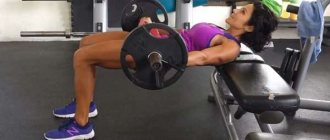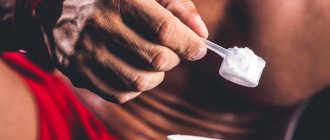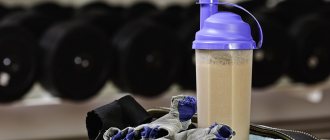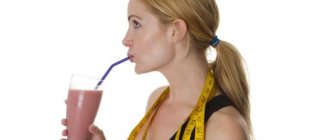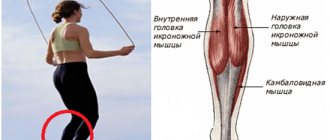After training
The peculiarities of the body are that loss of fluid immediately provokes swelling.
This is due to the fact that it tries to compensate for the lack of moisture by preserving the remaining water. Thus, the loss of water and its failure to replenish it is fraught with disruption of metabolic processes and the appearance of edema, and this does not contribute to the breakdown of subcutaneous fat. Therefore, lack of water negates all the efforts made during training.
Maintaining water balance after a workout also plays an equally important role.
Why should you drink after a workout?
Water is the main transporter of oxygen; it is responsible for the functioning of cells and the vital activity of tissues. You can not only drink water after a workout, but you also need it, regardless of the goal being achieved. Both a person losing weight and one building muscle mass must competently build a drinking diet.
During training, profuse sweating occurs, the lack of water must be replenished, otherwise the fat burning process will be inhibited. The greatest effectiveness from cardio training and strength exercises can be obtained only by maintaining a water regime. Weight training should also be supplemented with water to avoid muscular dystrophy, which can prevent not only muscle growth, but also harm your health in general. Don't forget about possible overheating and dehydration.
You should not deprive your body of water after exercise, as this can lead to thickening of the blood and lowering blood pressure. More serious consequences include the formation of kidney stones and fainting.
Tip: water consumption is not affected by the type of physical activity - whether a person does yoga, bodybuilding or cardio equipment.
How soon can you drink?
You can start drinking water immediately after training. You can drink the first glass in small sips, slowly. The remaining required amount of water is drunk over the next hour.
It should be taken into account that it is strictly forbidden to deny the body water after playing sports.
How much water to drink?
The volume that you can drink after training is determined by the amount of fluid consumed during exercise in the gym. To determine this mass, you should spend the day as follows:
- calculate (based on data on weight and physical activity) the required daily water requirement and try to stick to it throughout the day, consuming water evenly;
- weigh yourself before training;
- Drink no more than 2 glasses of water during training;
- After training, weigh yourself again;
- the difference that will be revealed in the indicators before and after training will be the volume that needs to be replenished.
After training, you can drink no more than a liter of water, depending on the volume of your stomach. It is recommended to distribute the entire water mass in this way: drink a glass of water within the first 5 minutes, and the rest only after 20 minutes.
What kind of water can I use?
Immediately after the end of the workout, you can drink only clean water without gas; it should also be filtered and without additives. Carbonated water causes bloating, sugar added to water increases the load on the heart, and salt prevents the removal of excess fluid, contributing to the deposition of extra pounds.
After 20 minutes after training, you can drink water with lemon - it starts metabolic processes and better quenches thirst. Coconut water also falls into this category - it is also healthy and has a beneficial effect on metabolism. During the same time period, you can drink mineral water, but without gas. The water temperature should be room temperature.
Tip: The time of year affects fluid intake - in summer, dehydration occurs faster; in winter, the rate of evaporation of water from the body also increases.
Drinking water throughout the day
There are also some recommendations on how to properly drink water throughout the day. So, it is recommended to drink a glass of clean water immediately after waking up. This will not only supply the body with fluid, but will also contribute to better cleansing of the intestines. Just this one step - a glass of water after waking up - can take your health to a whole new level. Simple, like everything ingenious! But before going to bed, you need to limit the amount of fluid you drink to reduce the load on your kidneys. During the day, be sure to drink whenever you feel the slightest sign of thirst. And try to drink not tea or coffee, but clean water.
During training
You can also drink water during your workout to prevent dehydration. During fitness, it is important to monitor the behavior of the body and catch signs indicating a lack of water. Strong thirst is a bad sign, indicating that fluid loss is critical; you should try to avoid this feeling. You can start drinking if your mouth is dry.
Why is it okay to drink water while playing sports?
Why energy and performance decrease due to lack of water can be explained by several aspects:
- water is a transporter of useful substances into cells and tissues. If this does not happen, then the metabolic process slows down, calorie burning stops, and the muscles do not receive the necessary components for construction;
- The load on the heart increases significantly, water helps reduce it;
- the liquid removes decay products that enter the blood during exercise, otherwise waste and toxins remain in the form of excess deposits.
These factors directly affect both weight loss and muscle building.
Advice: when exercising outdoors, follow the already mentioned recommendations for water regime. The exception is winter sports.
How much water to drink?
To prevent the feeling of fullness in the stomach (this causes discomfort during exercise), but at the same time to protect yourself from dehydration, you need to drink water every 20 minutes, taking small sips and not exceeding a single volume of 150 ml (if you don’t want to drink, then it can be reduced to 100 ml).
What kind of water to drink?
Preference should be given to filtered water at room temperature. It should not contain gas, salt and sugar - they increase the feeling of thirst and stop the process of losing weight. If the goal of training is to build muscle, then it is recommended to drink carbohydrate drinks during training, adhering to the specified norm.
How to drink correctly?
You need to drink water slowly, without taking large sips. If you are very thirsty, you can take liquid into your mouth, hold it and also drink in small sips - this will eliminate dryness. You should not drink while moving - you should take a short break, catch your breath and only then drink water, then wait a couple of minutes and resume exercises.
The benefits and importance of water for the athlete's body
The human body is 2/3 liquid. She is directly involved in many processes and regulates the operation of some systems. In particular, water helps build high-quality muscle mass, improves the performance and effectiveness of the training process.
Benefits of water for the human body:
- Detoxification. Water accelerates the process of removing decay products, toxins and waste from the body. You should increase the amount of fluid consumed while following a protein diet. It will accelerate the elimination of ketones, urea and nitrogen.
- Normalization of metabolism and acceleration of the fat burning process. With a lack of water, the kidneys cannot function fully. In this case, the products enter the liver. As a result of the increased load, the organ is not able to fully cope with its functions, as a result of which it burns less fat. Therefore, sufficient water intake not only normalizes the functioning of the kidneys and liver, but also accelerates the process of fat burning.
- Maintaining moisture in the body. Insufficient moisture intake leads to fluid accumulation and swelling.
- Normalization of the gastrointestinal tract. Staying hydrated helps digest food and prevents constipation.
- Improves the absorption of many sports supplements, such as creatine or carnitine, as well as water-soluble vitamins.
Lack of water in the body impairs the absorption of carbohydrates and fats. Deficiency reduces endurance and physical strength, leads to apathy and loss of strength, and significantly impairs performance.
During training, the athlete sweats a lot, which causes increased fluid loss. If the balance is not replenished in a timely manner, dizziness and weakness appear. In some cases, loss of consciousness is possible.
Physiological processes occur in the human body that maintain water balance. Primarily thirst and fluid elimination, which can be through urination, breathing or sweating.
Is it possible to drink water before training?
Here, the opinion of experts is also similar - they insist on drinking clean filtered water before starting a workout. But there are a few recommendations to take into account:
- an hour before training, you can drink 0.4 liters of water, which must be distributed evenly, leaving the last 10-20 minutes for urination;
- the last glass should contain cooler water, but not ice;
- You cannot drink a lot of water at a time, a single volume should not exceed one glass;
- a sweet liquid can give energy, but it is better to sweeten it with natural ingredients - water with honey is very useful;
- Lemon water also has an invigorating effect - you can also drink it before training.
All of the above conditions will help start your metabolism, making your workout more effective, and dull the feeling of hunger.
You should also rely on the general daily norm (calculated based on weight and activity indicators); it must include a calculation of fluid intake during the training process.
When drinking water when building a training plan, it is important to adhere to the rule - drink often, but in smaller volumes. It is necessary to control the water balance, avoid the feeling of thirst, but at the same time do not forget about the harmful effects of excess moisture.
If you become dehydrated while exercising
During training processes, the loss of water, first of all, thickens the blood, that is, its viscosity increases, and the brain and muscle tissue continue to urgently need nutrients and oxygen. Then, in order to deliver the necessary nutritional elements to their destination, pumping the thickened blood, the heart begins to work in increased mode. With an increase in heart rate, the load on the heart increases many times, and body temperature increases. Then comes a loss of stamina and coordination. Oxygen starvation occurs, leading to dizziness. Under such conditions, the effectiveness of training rapidly decreases, and heavy loads on the heart increase the likelihood of developing heart diseases such as ischemia and negate the positive results.
The effect of H2O on the human body
The fact that the human body needs water to exist is undeniable.
At the same time, beneficial properties and positive effects on organs depend on its temperature .
It seems more logical to drink cold water, especially during hot periods. Let's figure out which water is better to drink: warm or cold.
On topic: Training methods for yourself
Benefits of drinking warm liquid
By “warm” water we mean a temperature a couple of degrees higher than body temperature, but not boiled water.
Benefits of drinking warm water:
- cleansing the digestive system from impurities and food debris;
- improvement of metabolism;
- renewal of blood, organs and systems of the body perform their functions efficiently;
- waste and toxins are removed;
- the skin becomes elastic and tightened.
In addition, warm water helps eliminate spasmodic pain and menstrual pain. Has a calming effect and improves sleep quality. However, you should not drink too much water at night.
Why is it harmful to drink cold drinks?
The false idea that water from the refrigerator can quench your thirst can lead to disastrous consequences. It is not for nothing that Eastern people drink tea in hot weather, which helps to start the natural cooling of the body.
What are the results of drinking cold water?
Stress for the gastrointestinal tract. As a result of vasoconstriction, the process of food digestion deteriorates.- Slowing the supply of oxygen to internal organs.
- Lack of vigor, the body spends energy on restoring temperature.
- Too cold water can lead to ENT diseases of the upper respiratory tract.
If you really want to treat yourself to a cool drink and quench your thirst, you should give preference to water at room temperature with a piece of ice, mint, ginger or lemon.




